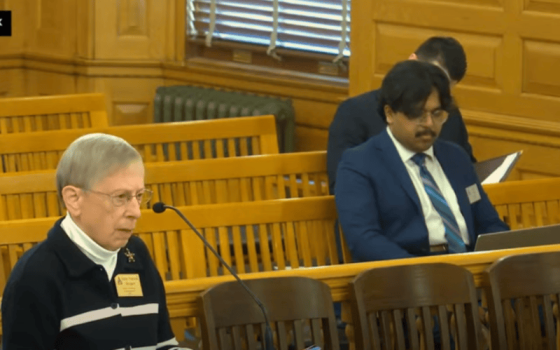
As part of the NCR Blog effort to put a human face on the immigration issue, here is a short but powerful documentary about a group of women in the southeastern Mexican state of Veracruz who provide food for the desperate Central American migrants passing by on the tops of trains bound for the U.S border.
The women, known as Las Patronas, daily prepare beans, rice and bread and bottles of water to pass to the riders who cling to the rolling trains like flies, thus the name el tren de las moscas.
The name captures the dehumanization of these economic migrants who can find no work in their home countries. Conditions are so tenuous in Honduras, Guatemala and El Salvador that each year an estimated half million people risk their lives and face enormous obstacles to come north, where plentiful low-wage jobs await them. Despite a multi-billion-dollar effort to seal the border and increase staff, migrants continue to flow north to find work to provide for their families.
The 14-minute video is in Spanish, but no translation is needed to convey the dramatic and poignant transfer of the food and water, and the joy of the women who come together daily to provide this basic assistance to passing strangers they regard as brothers and sisters and as fellow human beings.
With their labor and meager resources, the woman offer a life-giving solidarity to refugees whose existence indicts the political and economic systems that have created zones American economist Jeffrey Sachs has called “poverty traps” because of “the chaotic manner in which globalization of untrammeled free-market capitalism has taken place. This is the principal force behind massive migration around the world….”
For more information, see Jesuit Fr. Dean Brackley’s essay in our Immigration Conference folder at the Celebration Web site.
The issues are complex, but the results are also personal -- human beings clinging to the tops of trains moving up through Mexico in hope of reaching San Diego, Nogales, El Paso and unpopulated desert and river crossings in between.
The need for immigration reform will not solve the larger issues that drive global migration, but no policy will be comprehensive that does not take into account Las Patronas and those who ride el tren de las moscas in Veracruz, Mexico.
[Pat Marrin is editor of Celebration, the worship resource of the National Catholic Reporter. His e-mail address is patmarrin@aol.com.]
For readers who want a better understanding of the plight of immigrants who come north by train, the 2009 film “Sin Nombre” (“Nameless”) depicts this with unparalleled dramatic force.




